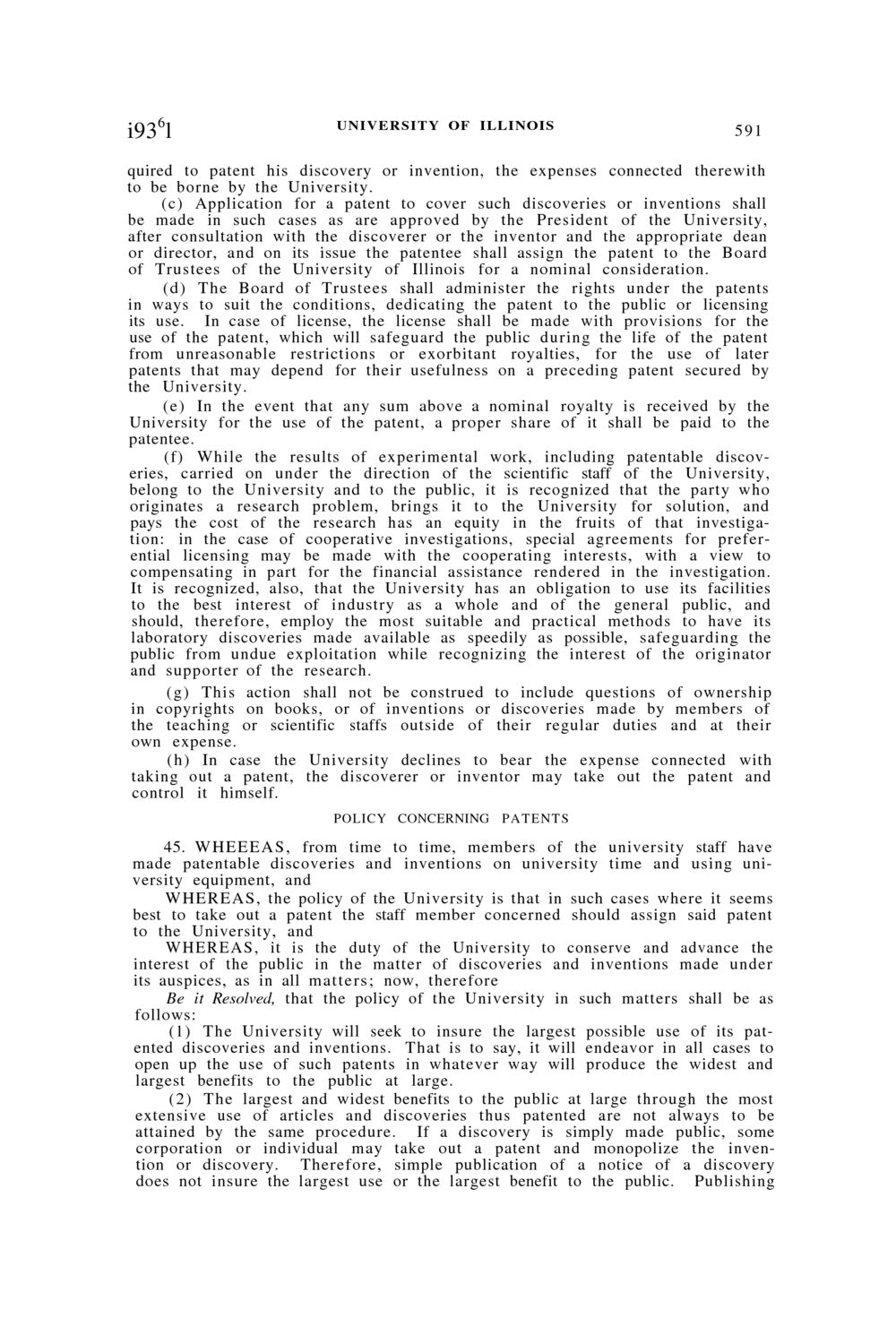| |
| |
Caption: Board of Trustees Minutes - 1936
This is a reduced-resolution page image for fast online browsing.

EXTRACTED TEXT FROM PAGE:
i936l UNIVERSITY OF ILLINOIS 591 quired to patent his discovery or invention, the expenses connected therewith to be borne by the University. (c) Application for a patent to cover such discoveries or inventions shall be made in such cases as are approved by the President of the University, after consultation with the discoverer or the inventor and the appropriate dean or director, and on its issue the patentee shall assign the patent to the Board of Trustees of the University of Illinois for a nominal consideration. ( d ) T h e Board of Trustees shall administer the rights under the patents in ways to suit the conditions, dedicating the patent to the public or licensing its use. In case of license, the license shall be made with provisions for the use of the patent, which will safeguard the public during the life of the patent from unreasonable restrictions or exorbitant royalties, for the use of later patents that may depend for their usefulness on a preceding patent secured by the University. ( e ) In the event that any sum above a nominal royalty is received by the University for the use of the patent, a proper share of it shall be paid to the patentee. (f) While the results of experimental work, including patentable discoveries, carried on under the direction of the scientific staff of the University, belong to the University and to the public, it is recognized that the party who originates a research problem, brings it to the University for solution, and pays the cost of the research has an equity in the fruits of that investigation: in the case of cooperative investigations, special agreements for preferential licensing may be made with the cooperating interests, with a view to compensating in part for the financial assistance rendered in the investigation. It is recognized, also, that the University has an obligation to use its facilities to the best interest of industry as a whole and of the general public, and should, therefore, employ the most suitable and practical methods to have its laboratory discoveries made available as speedily as possible, safeguarding the public from undue exploitation while recognizing the interest of the originator and supporter of the research. ( g ) This action shall not be construed to include questions of ownership in copyrights on books, or of inventions or discoveries made by members of the teaching or scientific staffs outside of their regular duties and at their own expense. ( h ) In case the University declines to bear the expense connected with taking out a patent, the discoverer or inventor may take out the patent and control it himself. POLICY CONCERNING P A T E N T S 45. W H E E E A S , from time to time, members of the university staff have made patentable discoveries and inventions on university time and using university equipment, and WHEREAS, the policy of the University is that in such cases where it seems best to take out a patent the staff member concerned should assign said patent to the University, and W H E R E A S , it is the duty of the University to conserve and advance the interest of the public in the matter of discoveries and inventions made under its auspices, as in all m a t t e r s ; now, therefore Be it Resolved, that the policy of the University in such matters shall be as follows: (1) The University will seek to insure the largest possible use of its patented discoveries and inventions. That is to say, it will endeavor in all cases to open up the use of such patents in whatever way will produce the widest and largest benefits to the public at large. ( 2 ) T h e largest and widest benefits to the public at large through the most extensive use of articles and discoveries thus patented are not always to be attained by the same procedure. If a discovery is simply made public, some corporation or individual may take out a patent and monopolize the invention or discovery. Therefore, simple publication of a notice of a discovery does not insure the largest use or the largest benefit to the public. Publishing
| |